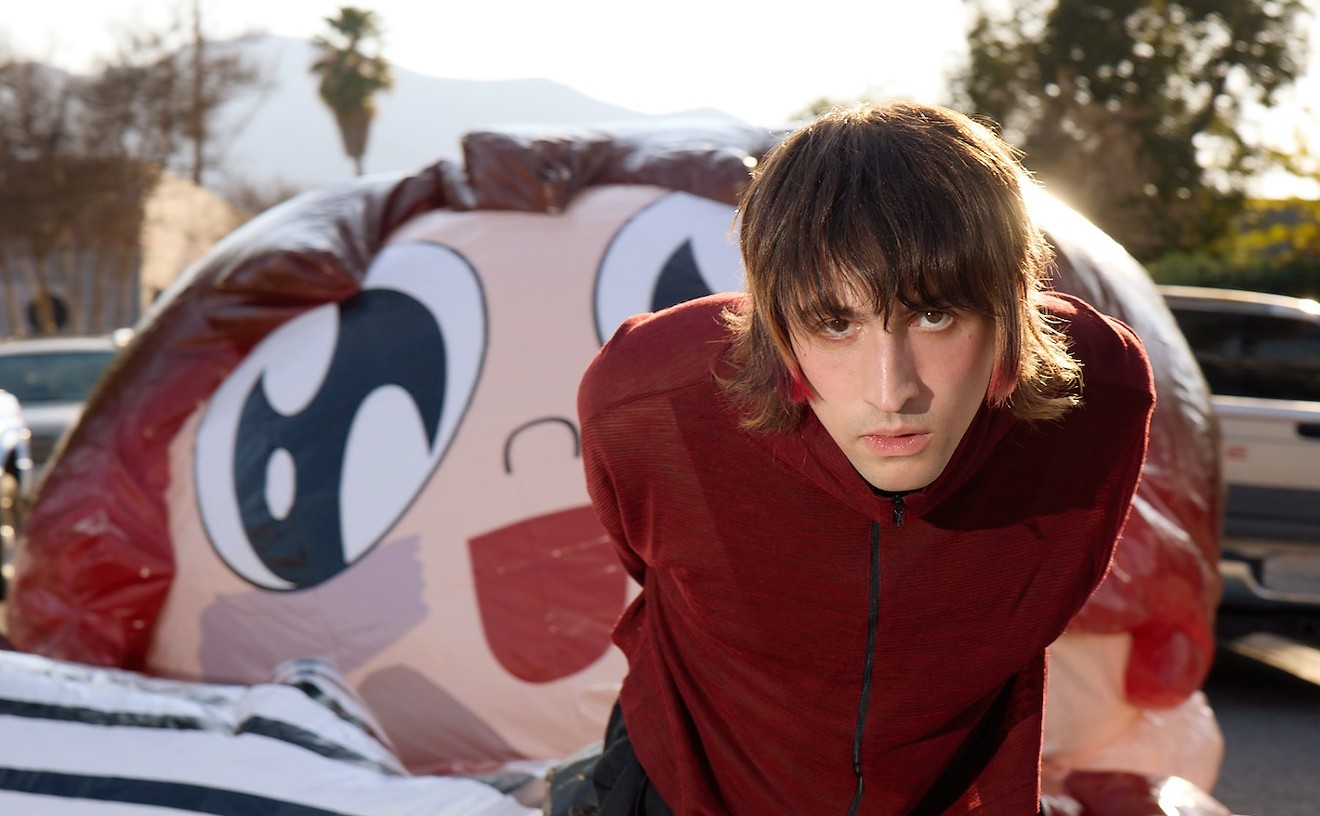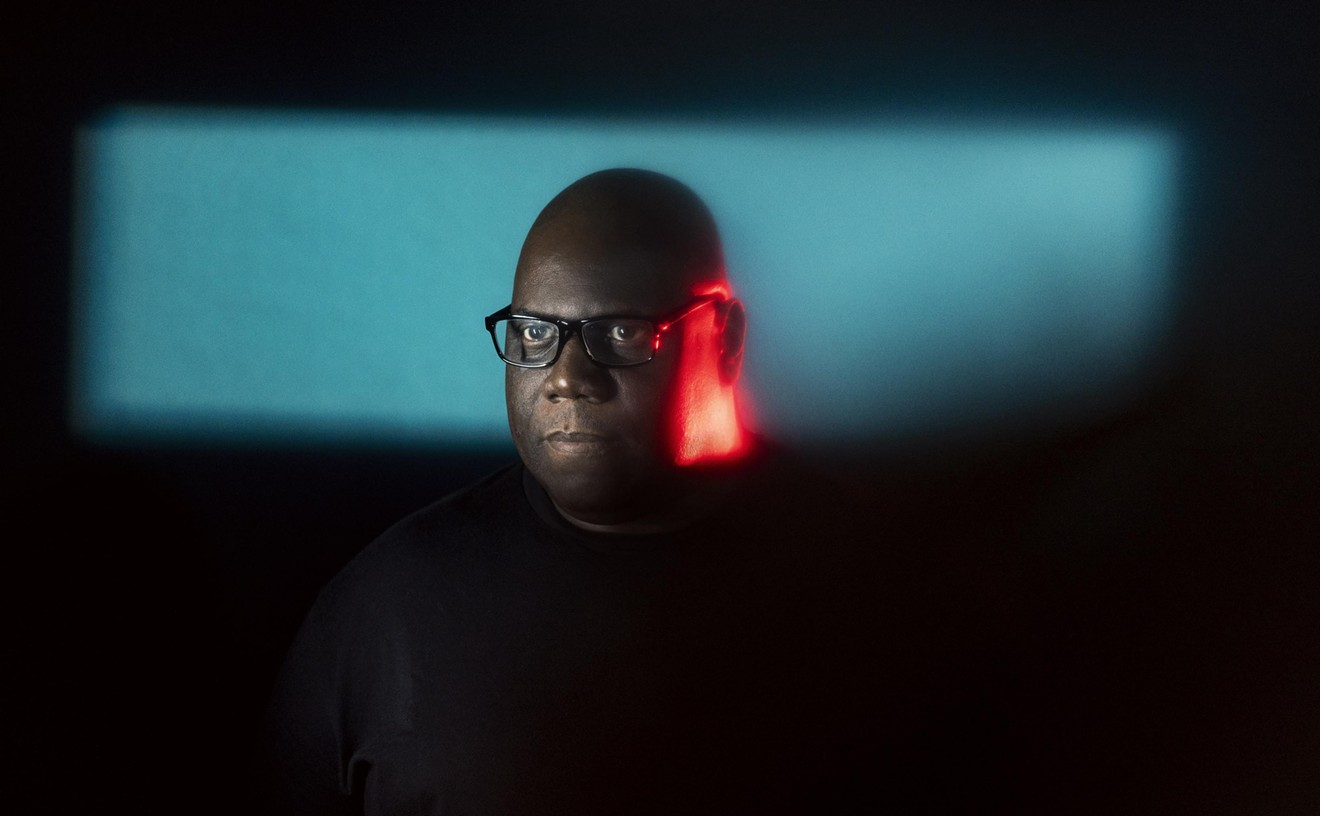The English quartet Late of the Pier are among their homeland's best, brightest young hopes, with all the high cheekbones and music press praise that usually entails. But don't mistake them for one of the dour, fedora-ed Brit indie groups of recent years. This band makes fun music for the kids full of herky-jerky rhythms and off-kilter synth stabs with a glam, chrome glaze. "The emerging scene in the U.K. at the moment is this way of thinking of just trying to be a little different," says 21-year-old drummer/percussionist Ross Dawson. "It's kind of a post-Libertines backlash, after all those hundreds of guitar bands."
While rooted, at least here and there, in pop structures, the band's sound is nothing if not idiosyncratic. Just check Late of the Pier's debut album, Fantasy Black Channel, released this past year -- really, no two songs are truly alike. One of the album's best, "Bathroom Gurgle," starts with a narcotic dance beat, with tinny keyboards and frontman Samuel Eastgate's robotic croon taking the song back to a frosty New Romanticism. A minute later, he goes falsetto in a bit of Eighties-style blue-eyed soul, before returning to an almost-chorus that would make Devo whip it. Rather than sound disjointed, though, it somehow fits together, a large part of the song's excitement derived from waiting to see where it will go next.
Part of this singular approach has been fostered by the band's relative geographic isolation. Heads up, Americans -- the rest of England is far different from a tourist's London. Late of the Pier hails from the sleepy Castle Donington, a town of 7000 in the East Midlands. Exposure to any kind of scene per se came from the occasional trip to the big city down south. "We'd go down and visit these music scenes, but we never really became part of any scene," Dawson says. "We'd retreat back to the Midlands to the semi-rural area where we live. So there was no going out to clubs or anything, it was quite remote."
The influences in the band's formative years -- when the members were around 14 years old -- came from closer to home. "I think we just arrived on the sound mainly from our parents' record collections. And between us, our musical tastes span pretty much every genre, really, at some point or another," he says. "I guess we just get really bored, and as a result, we have a very diverse sound. There are 20 to 30 influences in just one song."
Their musical free-for-all, though, is still anchored by a mature dance floor sensibility, which won the band an early, fast friend in nouveau electro demigod Erol Alkan. During a minor bidding war for the band, one label flew the producer down to meet Late of the Pier at a club. When punky, funky magic happened on the original, 2007 version of "Bathroom Gurgle," they tapped him to produce the rest of the album.
The friendship has lasted. Eastgate, under his own production pseudonym La Priest, has released a track or two through Alkan's Phantasy Sound label. And this Friday, Alkan has invited the band to play live at his Erol Alkan and Friends party at the Vagabond, the night before the band takes the stage on Ultra's second day.
New Times caught up with Dawson by phone recently to discuss his band's debut U.S. tour. The Q&A -- and information about the band's WMC appearances -- follows below.
New Times: First of all, what's up with the band's name?
Ross Dawson: The name actually doesn't really mean anything. The point of why we chose it is because it doesn't mean anything, and because it's random, really. A lot of band names mean something, and when you have a name like that, it often gets connotations, I guess. The thing with our name, as well, is it brings a lot of different things to mind for different people, just like our music does.
You grew up in the Midlands, and I think a lot of Americans don't realize there's a difference between the rest of England and London. What was the scene like where you were from?
Oh, there's a massive difference! The truth is, there's not much going on the Midlands. There's a few things, but we used to travel down to London a lot. It was like the big city you know -- we were about 18 or whatever, quite young. We'd go down and visit these music scenes, but we never really became part of any scene -- we'd retreat back to the Midlands to the semi-rural area where we live. So there was no going out to clubs or anything, it was quite remote.
A lot has been said about your start playing in underage clubs. How did that come about?
When we went down to London, we were lucky enough to get absorbed in this music scene. We sort of appealed to young people with our strong, vibrant sort of music, and they appealed to us because they're very open-minded and they're not embarrassed about having a good time or bothered about trying to be cool or whatever. It was amazing playing to such enthusiastic people, because a lot of them haven't really been to gigs before.
How old are you now?
I'm 21, nearly 22.
And with this sort of reputation, have you had any problems reaching fans who are, in fact, of age?
I wouldn't say a problem. Our fan base is generally younger, but as we've been progressing, older people have been bore interested. A lot of the influences we draw on, 90 percent are actually from bands that aren't contemporary.
And how did you arrive at your sound? How did you synthesize all those different influences?
I think we just arrived on the sound mainly from our parents' record collections. Between us, our musical tastes span pretty much every genre, really, at some point or another. I guess we just get very bored, and really excited about trying new stuff out. As a result, we have a very diverse sound. There are 20 to 30 influences in just one song. But it's bery thought through -- the album took us about seven years, from beginning to end. So each song has gone through a number of variations.
So how old were you all when you started writing it?
Like 15, actually. Sam, the lead singer and main writer, he'd been jotting down a few ideas just before we started, so that's when some of the songs are from. "Like VW," the instrumental, is the earliest one.
Do you get sick of playing songs you've been hearing since you were 15?
Not sick, no. We're very proud of them.We've got some new songs that we've been working on, and we're trying to get them in the set for America to get our minds a break, to show America what else we've been more recently.
How is your sound evolving on those new songs?
I'm actually really pleased with the way it's evolving. We're only doing five more songs, I'd say it's a lot more linear-sounding, but just as innovative. The way we constructed songs when we did the record was, we did it by sections, and they didn't stick to traditional song structures. And this time it's more like verse-chorus. I think the older fans might appreciate it more, because it's a bit more flowing and not as schizophrenic.
How did you meet Erol Alkan and begin working with him?
We just met him at a club. When we were in talks with different labels, one of the labels brought him down. I've got to say, we met him and we became friends before we worked together, because we're sort of like-minded. We just did a single with them and asked him to produce the album.
He's the best producer I've ever worked with. He did produce the album, but I'd say probably not in the traditional sense. His role was very -- you couldn't label it really. His taste is so eclectic, he's got the most vast knowledge of everyone I've ever met, about music. If we came up with a vision or something for a song, he was able to share that. It's like we were on the same wavelength. He was able to take any idea we had and just work with it.
Wach of the songs is so different, and he was able to embrace that fully. I'd say one of the only things it continuous through the album is the style of production, and he gathered the crazy mix of songs we had and made them a little more together.
Almost every review I've read of your album has compared you to Gary Numan. Do you agree with that?
I definitely agree Gary Numan is an influence, but one of hundreds. I think one of the main reasons we get labeled with Gary Numan a lot because it says that on our Wikipedia. Interviewers say Frank Zappa, Gary Numan, and someone else -- because it says that on our Wikipedia!
Your Wikipedia page also cites your contemporary peers as being groups like Metronomy and the Klaxons. Do you feel anything in common with those bands?
Yeah, yeah, to an extent. I can't say the music sounds alike, at all, but it's a couple of young guys trying to do something a little bit different. The emerging scene in the UK at the moment is this way of thinking of just trying to be a little different. It's kind of a post-Libertines backlash, after all those hundreds of guitar bands.
Late of the Pier, at the Erol Alkan and Friends party. With Erol Alkan, Hercules and Love Affair (DJs), Rory Phillips, and Rye Rye. Friday, March 27. The Vagabond, 30 NE 14th St., Miami. Doors open at 10 p.m. Tickets cost $10 in advance from wantickets.com. Ages 21+ with ID. 305-379-0508; thevagabondmiami.com
Also performing at Ultra Music Festival, Day Two. With The Prodigy, Paul van Dyk, Armin van Buuren, Eric Prydz, Above & Beyond, and others. Saturday, March 28. Bicentennial Park, 1075 Biscayne Blvd., Miami. Gates open at 1 p.m.Tickets cost $99.95 to $350. ultramusicfestival.com










